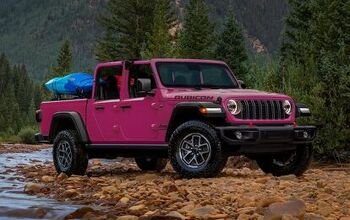Suzuki Death Watch 5: How Deep Would You Cut to Make a Profit?

The grim reaper may not be at American Suzuki’s door step after all. We’ve learned ASMC is healthier, at least financially, than we thought. But, in order to be profitable last year, ASMC had to completely cut almost every non-essential (and some essential) function of their business.
American Suzuki has been very conservatively run since introducing its motorcycle line to North America. With the automotive division only selling 26,618 units last year in the US (that’s less than both Porsche and Land Rover) and margins on those vehicles – all imported from outside North America, except for the Equator – being razor thin, it was clear as day serious cuts needed to be made if coming out of the year in the black was the main goal.
Public Relations? What Public Relations?
As we mentioned in an earlier Suzuki Death Watch article, Melissa Fujimoto is currently fielding media requests after the departure of PR veteren Jeff Holland. Before her media wrangling duties, Fujimoto spent around 10 years with promotions in an administrative role at ASMC. In 2011, all promotions activities were cancelled, leaving Fujimoto without a portfolio. So, instead of releasing the long-term, loyal employee, they made the logical choice and moved her on to other duties.
Those other duties, while including media relations, are mainly as secretary for ASMC President Seiichi Maruyama.
This may seem odd, but it makes sense when you realize ASMC’s current position. There are no plans to release any new product in the next 12-18 months, save facelifts for the Grand Vitara and SX4, so there are not a ton of media requests. Most current PR duties include reporting monthly sales and managing the press fleet, which can easily be managed by someone whose background is an administrative role in promotions.
ASMC still outsources other PR and marketing duties to Paine PR.
Auto Shows? What Auto Shows?
Before last year, ASMC participated in 66 auto shows. That number has been cut down to four. With no new product in the wings, going to extra auto shows is just an added marketing expense that isn’t needed. In some ways, it is a smart move to cut costs, yet it really takes the brand out of the public eye that may not live close to a Suzuki dealer.
The number of dealers is also dwindling. Current dealer development is arrested, with a number of franchise owners taking $50,000 buy outs to close their doors.
Everything Is Being Cut To The Bone
ASMC has lost top notch talent and has been selling very low volumes of cars with even lower margins. Yet, in 2011, ASMC made a profit and sent bonus checks to all its employees.
“People don’t understand how frugally (Suzuki) can run a car company,” said one source who spoke under condition of anonymity, “When employees of other automakers tell me how much they spend on things, it blows me away.”
Those profits come with a cost. Brand recognition is at an all time low. Product development is virtually non-existant. And, over time, more talent will leave for less stressful pastures. While the mood at Suzuki is currently said to be “normal”, its hard to ignore the deafening silence of a dearth of new product and a shrinking dealer network.

More by Mark Stevenson
Latest Car Reviews
Read moreLatest Product Reviews
Read moreRecent Comments
- Bd2 The "e" nomenclature signifies the e-ATPs which BMW is pursuing.
- Dave M. I'm sorry to see any storied name go away. The lifespan of the Malibu has fit perfectly in my lifetime years-wise. Some of the highlights include the first and second generations, the '78 revamp (very clean design), and the 2005 generation. Ford, GM and Mopar gave this segment away by allowing Toyota and Honda a foot in the door and then always having to play catch-up. How hard is it to make a truly competitive sedan at a profit? Obviously, Japan Inc. figured it out.I've driven a few rentals these past years; the Malibu got the job done but honestly the Passat and Altima were my rental preferences.
- Kcflyer actually yes. It's a shame that a product this uncompetitive can still outsell GM's entire EV offerings. Those products have had billions thrown at them. Imagine how nice the new Malibu, Impala, SS, and Lacrosse would be with that kind of commitment.
- 3SpeedAutomatic Nope....
- Bd2 Looking forward to flooding the rental lots with Hyundai and Kia models, this is just one obstacle now eliminated.


































Comments
Join the conversation
Perhaps Suzuki intends to survive like Checker Motor Co., which limped through the 1980s selling a few taxicabs and doing metal stamping for GM. Surprisingly, Checker did not file for bankruptcy until 2009.
Why not rebadge other Japanese models and sell them as Suzuki in US. E.g. let them rebadge Nissan Altima as Suzuki and in exchange let Nissan sell pianos and other musical instruments under their badge. As far as I know it is normal practice in Japan. IIRC Suziku were rebadged Daewoos until recently. Then they tried to sell some obscure model based on GM short wheelbase platform which was praised by journalists.